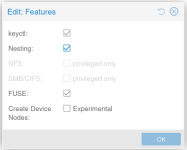I have a problem with starting podman as a non-root user on LXC. I have tried it on Debian and Fedora based LXC without success. Installation gone fine, on root account works fine but every podman command from non-root account ends with:
cockpit@Test:~$ podman info
ERRO[0000] running `/usr/bin/newuidmap 4852 0 1000 1 1 165536 65536`: newuidmap: write to uid_map failed: Operation not permitted
Error: cannot set up namespace using "/usr/bin/newuidmap": exit status 1
on root account
cockpit@Test:~$ sudo podman info
[sudo] password for cockpit:
host:
arch: amd64
buildahVersion: 1.28.2
cgroupControllers:
- cpu
- memory
- pids
cgroupManager: systemd
cgroupVersion: v2
conmon:
package: conmon_2.1.6+ds1-1_amd64
path: /usr/bin/conmon
version: 'conmon version 2.1.6, commit: unknown'
cpuUtilization:
idlePercent: 98.59
systemPercent: 0.41
userPercent: 1
cpus: 2
distribution:
codename: bookworm
distribution: debian
version: "12"
eventLogger: journald
hostname: Test
idMappings:
gidmap: null
uidmap: null
kernel: 6.5.11-8-pve
linkmode: dynamic
logDriver: journald
memFree: 8258920448
memTotal: 8589934592
networkBackend: netavark
ociRuntime:
name: crun
package: crun_1.8.1-1+deb12u1_amd64
path: /usr/bin/crun
version: |-
crun version 1.8.1
commit: f8a096be060b22ccd3d5f3ebe44108517fbf6c30
rundir: /run/crun
spec: 1.0.0
+SYSTEMD +SELINUX +APPARMOR +CAP +SECCOMP +EBPF +YAJL
os: linux
remoteSocket:
exists: true
path: /run/podman/podman.sock
security:
apparmorEnabled: false
capabilities: CAP_CHOWN,CAP_DAC_OVERRIDE,CAP_FOWNER,CAP_FSETID,CAP_KILL,CAP_NET_BIND_SERVICE,CAP_SETFCAP,CAP_SETGID,CAP_SETPCAP,CAP_SETUID,CAP_SYS_CHROOT
rootless: false
seccompEnabled: true
seccompProfilePath: /usr/share/containers/seccomp.json
selinuxEnabled: false
serviceIsRemote: false
slirp4netns:
executable: /usr/bin/slirp4netns
package: slirp4netns_1.2.0-1_amd64
version: |-
slirp4netns version 1.2.0
commit: 656041d45cfca7a4176f6b7eed9e4fe6c11e8383
libslirp: 4.7.0
SLIRP_CONFIG_VERSION_MAX: 4
libseccomp: 2.5.4
swapFree: 0
swapTotal: 0
uptime: 0h 10m 36.00s
plugins:
authorization: null
log:
- k8s-file
- none
- passthrough
- journald
network:
- bridge
- macvlan
volume:
- local
registries: {}
store:
configFile: /etc/containers/storage.conf
containerStore:
number: 0
paused: 0
running: 0
stopped: 0
graphDriverName: overlay
graphOptions:
overlay.mount_program:
Executable: /usr/local/bin/overlayzfsmount
Package: Unknown
Version: 'mount from util-linux 2.38.1 (libmount 2.38.1: selinux, smack, btrfs,
verity, namespaces, assert, debug)'
overlay.mountopt: nodev
graphRoot: /var/lib/containers/storage
graphRootAllocated: 32212254720
graphRootUsed: 1242038272
graphStatus:
Backing Filesystem: zfs
Native Overlay Diff: "false"
Supports d_type: "true"
Using metacopy: "false"
imageCopyTmpDir: /var/tmp
imageStore:
number: 0
runRoot: /run/containers/storage
volumePath: /var/lib/containers/storage/volumes
version:
APIVersion: 4.3.1
Built: 0
BuiltTime: Thu Jan 1 00:00:00 1970
GitCommit: ""
GoVersion: go1.19.8
Os: linux
OsArch: linux/amd64
Version: 4.3.1
User has its subordinates defined
cockpit@Test:~$ grep cockpit /etc/subuid /etc/subgid
/etc/subuid:cockpit:165536:65536
/etc/subgid:cockpit:165536:65536
The same installation on VM works flawlessly, but on LXC I can't force it to work.
cockpit@Test:~$ podman info
ERRO[0000] running `/usr/bin/newuidmap 4852 0 1000 1 1 165536 65536`: newuidmap: write to uid_map failed: Operation not permitted
Error: cannot set up namespace using "/usr/bin/newuidmap": exit status 1
on root account
cockpit@Test:~$ sudo podman info
[sudo] password for cockpit:
host:
arch: amd64
buildahVersion: 1.28.2
cgroupControllers:
- cpu
- memory
- pids
cgroupManager: systemd
cgroupVersion: v2
conmon:
package: conmon_2.1.6+ds1-1_amd64
path: /usr/bin/conmon
version: 'conmon version 2.1.6, commit: unknown'
cpuUtilization:
idlePercent: 98.59
systemPercent: 0.41
userPercent: 1
cpus: 2
distribution:
codename: bookworm
distribution: debian
version: "12"
eventLogger: journald
hostname: Test
idMappings:
gidmap: null
uidmap: null
kernel: 6.5.11-8-pve
linkmode: dynamic
logDriver: journald
memFree: 8258920448
memTotal: 8589934592
networkBackend: netavark
ociRuntime:
name: crun
package: crun_1.8.1-1+deb12u1_amd64
path: /usr/bin/crun
version: |-
crun version 1.8.1
commit: f8a096be060b22ccd3d5f3ebe44108517fbf6c30
rundir: /run/crun
spec: 1.0.0
+SYSTEMD +SELINUX +APPARMOR +CAP +SECCOMP +EBPF +YAJL
os: linux
remoteSocket:
exists: true
path: /run/podman/podman.sock
security:
apparmorEnabled: false
capabilities: CAP_CHOWN,CAP_DAC_OVERRIDE,CAP_FOWNER,CAP_FSETID,CAP_KILL,CAP_NET_BIND_SERVICE,CAP_SETFCAP,CAP_SETGID,CAP_SETPCAP,CAP_SETUID,CAP_SYS_CHROOT
rootless: false
seccompEnabled: true
seccompProfilePath: /usr/share/containers/seccomp.json
selinuxEnabled: false
serviceIsRemote: false
slirp4netns:
executable: /usr/bin/slirp4netns
package: slirp4netns_1.2.0-1_amd64
version: |-
slirp4netns version 1.2.0
commit: 656041d45cfca7a4176f6b7eed9e4fe6c11e8383
libslirp: 4.7.0
SLIRP_CONFIG_VERSION_MAX: 4
libseccomp: 2.5.4
swapFree: 0
swapTotal: 0
uptime: 0h 10m 36.00s
plugins:
authorization: null
log:
- k8s-file
- none
- passthrough
- journald
network:
- bridge
- macvlan
volume:
- local
registries: {}
store:
configFile: /etc/containers/storage.conf
containerStore:
number: 0
paused: 0
running: 0
stopped: 0
graphDriverName: overlay
graphOptions:
overlay.mount_program:
Executable: /usr/local/bin/overlayzfsmount
Package: Unknown
Version: 'mount from util-linux 2.38.1 (libmount 2.38.1: selinux, smack, btrfs,
verity, namespaces, assert, debug)'
overlay.mountopt: nodev
graphRoot: /var/lib/containers/storage
graphRootAllocated: 32212254720
graphRootUsed: 1242038272
graphStatus:
Backing Filesystem: zfs
Native Overlay Diff: "false"
Supports d_type: "true"
Using metacopy: "false"
imageCopyTmpDir: /var/tmp
imageStore:
number: 0
runRoot: /run/containers/storage
volumePath: /var/lib/containers/storage/volumes
version:
APIVersion: 4.3.1
Built: 0
BuiltTime: Thu Jan 1 00:00:00 1970
GitCommit: ""
GoVersion: go1.19.8
Os: linux
OsArch: linux/amd64
Version: 4.3.1
User has its subordinates defined
cockpit@Test:~$ grep cockpit /etc/subuid /etc/subgid
/etc/subuid:cockpit:165536:65536
/etc/subgid:cockpit:165536:65536
The same installation on VM works flawlessly, but on LXC I can't force it to work.


